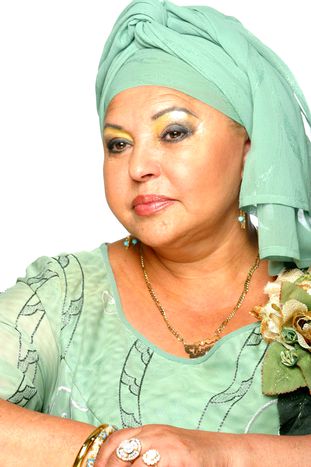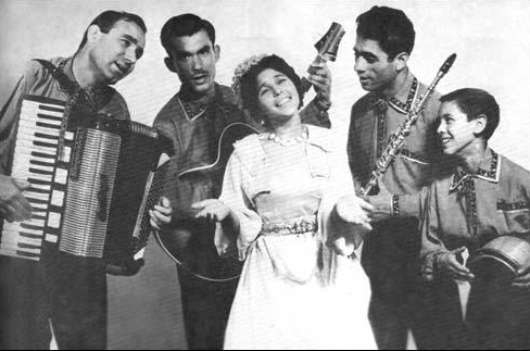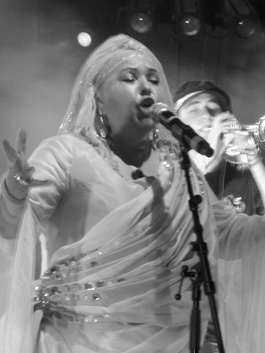
Esma Redzepova: 'Roma are cosmopolitan'
Published on
Translation by:
Annie RutherfordA mother of 47, a career spanning 20 albums and 40 years and songs in Serbian, Macedonian and Romany. At the Sin Fronteras festival in France, the Macedonian 'gypsy music queen' brings a bit of Roma culture to a country which is planning to export large numbers of its gypsy population 'back' to Romania and Bulgaria by the end of the month
Music has been a part of Esma Redzepova's life from an early age. 'I can't live without music,' she emphasises from an armchair in the hotel lobby where she has made herself comfortable. 'Music is my food, the air which I breathe.' It was singing as a girl on a Macedonian radio programme in 1956 that Esma caught the attention of producer, composer and future husband Stevo Teodosievski (1924 - 1997). Redžepova would end up leaving the family nest to attend the Belgrade music academy. The fruits of her global tours with her mentor and partner Teodosievski and his group resulted in over 15, 000 concerts and twenty albums.
'Queen of Romany songs'
Esma Redzepova looks petite as she sips on a white coffee from an ornate china cup. It would be easy to miss the Macedonian singer, yet even at the age of 64, she is what you would describe as 'funky'. Several golden rings flash on her fingers, and then there's her striking earrings. A straw hat with a ribbon and a dark blue dress mark a contrast to her exotic accessories. Born in 1945 in Skopje (in the-then Yugoslavia), Redzepova naturally supports the Macedonian bid to join the European Union (EU). The country, which declared its independence from Yugoslavia in 1991, saw its application to join the EU formally recognised in 2005. The problem is that Greece is opposing it, insisting that Macedonia change its name to the Former Yugoslavian Republic of Macedonia (Greece already has a region in the south-east called Macedonia - ed). 'That would be as if someone were to say to me, from now on you aren't called Esma any more,' shrugs Esma. 'Unfortunately we're not receiving any support from the other EU countries.' (The official EU stance is that the two governments sort out their disagreement between themselves - ed).
 The dimunitive star appears to be a grande dame and rightly so: 'I was awarded the title 'queen of romany songs' at the first ever festival of Roma (Romany) music in India in 1976. It stands for loyalty to the Roma people whom I have represented with dignity throughout the world.' Unwanted and discriminated against, the Roma are experiencing hard times at the moment in Europe. When asked whether she also has experienced this personally, Redžepova grins mischievously and breaks into such a flood of words that the interpreter can barely keep up. 'The first and only time that I was discriminated against was when I started school,' she exclaims. 'I was the only Roma. Nobody wanted to sit next to me. So I sat down next to a boy. It was a scandal, because boys and girls usually sat separated from one another! After that I was the star of the school without exaggeration. Even then I was tearing down the barriers.'
The dimunitive star appears to be a grande dame and rightly so: 'I was awarded the title 'queen of romany songs' at the first ever festival of Roma (Romany) music in India in 1976. It stands for loyalty to the Roma people whom I have represented with dignity throughout the world.' Unwanted and discriminated against, the Roma are experiencing hard times at the moment in Europe. When asked whether she also has experienced this personally, Redžepova grins mischievously and breaks into such a flood of words that the interpreter can barely keep up. 'The first and only time that I was discriminated against was when I started school,' she exclaims. 'I was the only Roma. Nobody wanted to sit next to me. So I sat down next to a boy. It was a scandal, because boys and girls usually sat separated from one another! After that I was the star of the school without exaggeration. Even then I was tearing down the barriers.'
Roma: sensitive, travellers
More seriously, Redzepova is familiar with the worries and problems of the Roma. 'The Roma are very sensitive,' she says. 'They sense that there is an unfair, inhumane boundary between them and others. It is like a garden where all the flowers are in bloom – and you tear out a single one.' Her homeland Macedonia is, she says, the only country in which the Roma are completely recognised in all areas of life; their rights as a minority have been part of the constitution since 2001.
'Roma houses are always open'
Indeed, Redzepova wants to change people's image of the Roma with her music, which is about Roma culture and not about the ways others see them. 'The Roma are against borders,' she says. 'They are cosmopolitans. Their houses are always open. Our philosophy is that we are naked when we arrive on the earth and naked when we leave it. The earth is there for everyone, it doesn't belong to anyone.' She passes this outlook on life down to her children – of which she has 47 adopted former street children. Many attended the music school founded by Redžepova and her late husband, and others play in her band. 'I tell them they should be good citizens. They must share with others. They must travel a lot.' She halts on this piece of advice, willingly sharing it with everyone: 'It is very, very important to travel, to see other places and to get to know other customs.' With Turkish-Serb parents who had Romanian and Jewish roots, Esma's family teems with christians, muslims, orthodox jews and many others. 'What should I say - we celebrate all holidays, no matter of which confession.'
 How the Macedonian singer wants to use her music for international understanding remains a little vague until I see her onstage on Saturday evening at the Parisian venue, the Cabaret Sauvage. Redžepova's outfits are unconventional and dazzling. She suffers with a black veil across her face. Now and again she bewitches both audience and band with her coquettish glances. 'I sing about suffering and joy, about the two extremes - there is nothing between them,' she explains, back in the hotel lobby. 'When I sing, I live what I am singing. I can communicate, with my mimics and my gestures. Music knows no language barriers.' The mixture of pride and modesty which characterises Redžepova appears: she is aware of her achievement and proud of it – and yet does not mention that she was nominated for the nobel peace prize in 2002. Other distinctions count more for her. 'My voice was once voted the second best in the world, after Ella Fitzgerald. That was important to me, as it was about an artistic distinction.' Esma Redžepova's eyes sparkle. 'Pavarotti only came seventh.'
How the Macedonian singer wants to use her music for international understanding remains a little vague until I see her onstage on Saturday evening at the Parisian venue, the Cabaret Sauvage. Redžepova's outfits are unconventional and dazzling. She suffers with a black veil across her face. Now and again she bewitches both audience and band with her coquettish glances. 'I sing about suffering and joy, about the two extremes - there is nothing between them,' she explains, back in the hotel lobby. 'When I sing, I live what I am singing. I can communicate, with my mimics and my gestures. Music knows no language barriers.' The mixture of pride and modesty which characterises Redžepova appears: she is aware of her achievement and proud of it – and yet does not mention that she was nominated for the nobel peace prize in 2002. Other distinctions count more for her. 'My voice was once voted the second best in the world, after Ella Fitzgerald. That was important to me, as it was about an artistic distinction.' Esma Redžepova's eyes sparkle. 'Pavarotti only came seventh.'
Images: Cabaret Sauvage ©Julia Korbik; main ©Accords Croisés; band ©myspace.com/redzepova/ videos © AsphaltTangoRecords and ©NBE TV/ both courtesy of Youtube
Translated from Esma Redžepova: "Königin des Roma-Gesangs"



